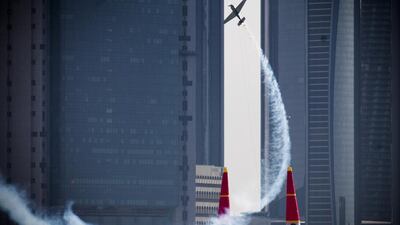ABU DHABI // He may have been the youngest of the 12 elite pilots in the Red Bull Air Race this weekend, but after finishing ahead of the race's defending champion in the Friday qualifying session, Canada's Pete McLeod was picking up steady support from spectators at the action-packed finale on Saturday.
Among the 30-year old’s supporters was South African engineer, Anton Kruger, who had been watching the race with friends.
“As you get to know the guys, you start picking favourites,” said the 50-year-old Abu Dhabi resident, who had chosen to back the Canadian. “I think he has got a big chance.”
As Mr McLeod made his way to the fastest eight, and then the fastest four to compete in the race’s action-packed finale, things were looking “so far, so good”, for his compatriot, Maurice Leclaire.
The 57-year-old mechanical consultant had travelled to the capital from Canada, together with his brother, Jerry, and a friend, Andrzej Konarzewski, to watch the race.
In the end, Britain’s Paul Bonhomme, the defending champion, who had fallen behind both McLeod and Austria’s Hannes Arch, his perennial rival, took the first spot. Bonhomme finished with the day’s best time – 56.439 seconds with Arch following at 57.776.
“There was huge pressure out there and it was so much work to get back here,” said Mr Bonhomme, who won the 2009 and 2010 championship ahead of Arch.
McLeod came in third, getting a career-first podium spot.
For Leclaire, this alone was reason to celebrate.
“I still think it is great,” he said. “To be on the podium with those people, that is great.”
Abu Dhabi’s race was the season opener for the world’s fastest motorsport series, which visits eight locations with the next round in Croatia in April.
vtodorova@thenational.ae

